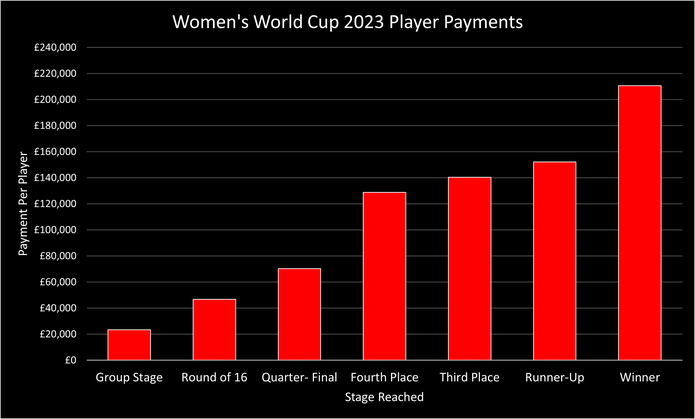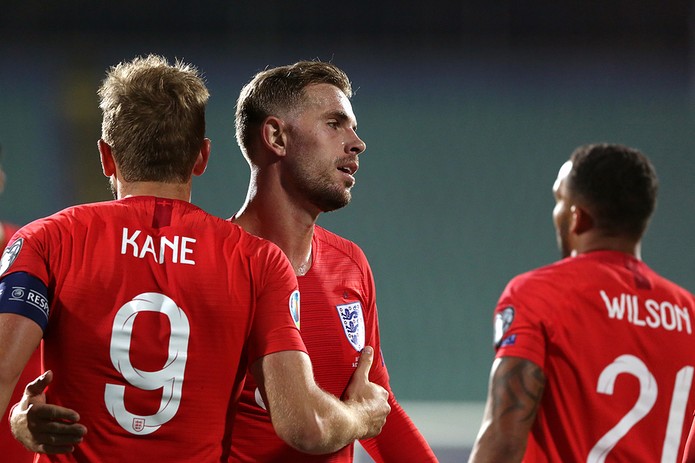 Although footballers at the top level get paid a rather handsome wage, not to mention benefitting from sponsorship deals, image rights sales and the like, there’s yet another way that they can make money.
Although footballers at the top level get paid a rather handsome wage, not to mention benefitting from sponsorship deals, image rights sales and the like, there’s yet another way that they can make money.
As in many businesses around the world, the players can earn performance-related pay thanks to their efforts on the pitch. That can be individual – goals scored, assists, clean sheets etc – or collective, with a bonus paid if the team reaches an agreed stage of a tournament.
Such bonuses are readily paid in club football, but at the international level? That’s where a grey area exists.
Just ask England’s Lionesses. The Football Association will not pay them bonuses for their efforts at the 2023 World Cup, and the players will instead have to make do with FIFA’s financial distribution model, which would see them earn payouts based on their performances up to £210,000 each for lifting the trophy.

But, as it stands, the Lionesses won’t receive a single penny from the FA for representing their country at the World Cup – in contrast to the football associations of the United States, Australia and co, who are paying their players a stipend on top of whatever they earn via FIFA’s system.
Lucy Bronze, one of the best footballers on the planet, has hit out at the FA for their stance.
“It is frustrating, but I think that’s the way the women’s game has predominantly been,” she said.
“I think the point of the players, and everyone involved in women’s football, is about taking it to the next level and pushing the ceiling, not wanting to have a ceiling put on our game, and making sure we leave the game in a better place than we found it.”
Do International Footballers Get Paid?

As we’ve learned, England’s women’s team do get paid for their efforts on the pitch – albeit by FIFA, rather than the Football Association.
But what about in the men’s game? There does seem to be a staggering level of inequality in English football, with players representing the Three Lions earning a fee – thought to be £2,000 per game.
However, since at least 2007, there has been a collective agreement amongst the players that this will be paid to the England Football Foundation, an organisation that then forwards on the money to their respective charitable partners.
What is also interesting is that the FA also receives prize money from UEFA and/or FIFA for performances in major tournaments. The governing body then decides how this payout is to be spent – usually it gets pumped into grassroots football and to support charities that are based on football initiatives.
Coaches and staff also receive a fee, and in the case of Ghana at the 2014 World Cup, a flat ‘appearance’ fee system was agreed in which all 23 players, the head coach James Kwesi Appiah and even the kit man and team masseur all earned $100,000 for their various toils.
Breakdown of #Ghana‘s appearance fees at the World Cup in Brazil. “Ball boy” (kit man) got as much as the head coach. pic.twitter.com/e01JQ9IRV5
— John Bennett (@JohnBennettBBC) June 25, 2015
Do Countries Earn Prize Money at the World Cup?

Do they ever.
Each nation at the men’s World Cup in 2022 earned £1.2 million just for qualifying for the action in Qatar, and that payout increased for each stage of the competition they progressed to.
For England, that guaranteed a grand total of £15.2 million – that £1.2 million appearance fee plus £14 million for reach the quarter-finals.
As for tournament winners Argentina, well, they had even more reasons to be cheerful. They banked £36.2 million in total from their triumphant turn in Qatar, with the vast majority of that winding its way to the AFA (Argentine Football Association).
As if to reiterate the inequality that exists between the two genders, if England were to get knocked out in the quarter-finals of the 2023 women’s World Cup, they would bank just £1.7 million for the FA. The winners take home just £3.3 million.
Do International Footballers Get Paid a Bonus?

Although payments made for appearances in friendly matches vary from one country to the next, for the most part all international players have a chance to earn bonuses outside of the major tournaments.
A win bonus is typically paid for qualification matches with a much-smaller fee paid if the team loses, although there’s no guarantee that international players will be awarded a bonus unless an agreement is reached by the nation’s governing body and a player representative group, such as the PFA in England.
Footballers get paid when they are injured, of course, and their club side will also ‘benefit’ from a bonus should one of their players pick up an injury while on international duty: they will be paid compensation for the duration of the time that the individual is on the sidelines.